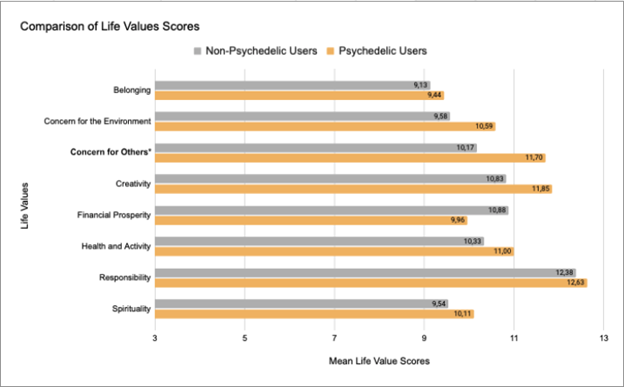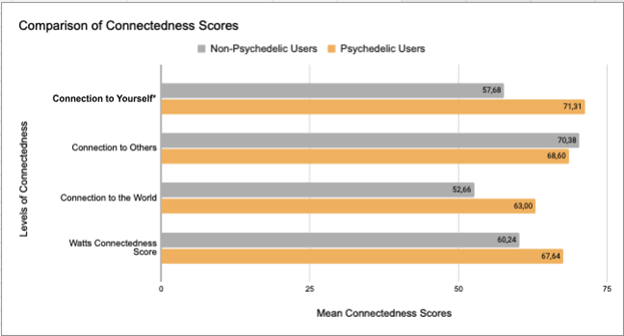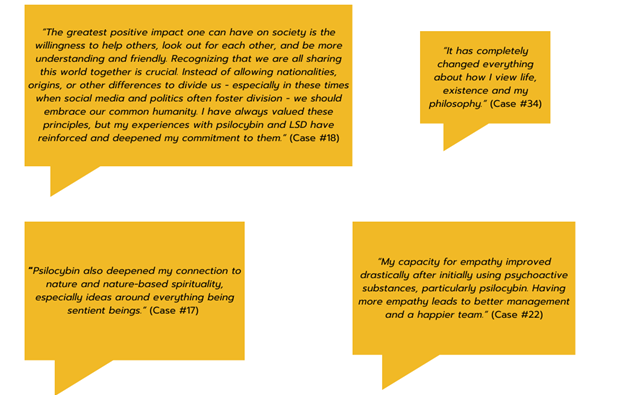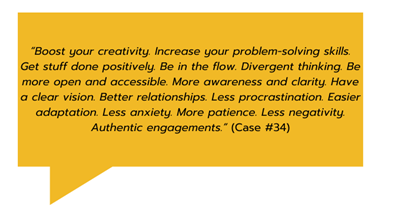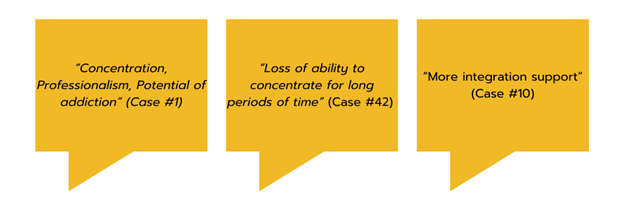Dmitrij Achelrod PhD
Contributing Authors
Ally Ginter
Dmitrij Achelrod PhD
Contributing Authors
Ally Ginter
Key Take-Aways
This article summarizes a thesis that explored the potential impact of psychedelic experiences on the values and beliefs of leaders. An online survey was conducted to measure leaders’ values, feelings of connectedness, and subjective experiences, with participants divided into two groups: leaders who had used psychedelics and those who had not. The survey was distributed within the Alumni network of the EvoSHIFT program to target participants with psychedelic experience, and on social media networks as well as within professional networks of acquaintances to reach leaders without such experiences.
Findings revealed that leaders with psychedelic experience scored significantly higher on Concern for Others and Connection to Self, indicating a positive shift toward altruistic values and greater self-awareness. Additionally, participants reported enhanced spirituality, creativity, openness, and an overall increased sense of connectedness. While the potential benefits for leadership development are promising, the study underscores the need for safe, structured programs to mitigate the risks associated with psychedelic use. Such programs can help guide leaders toward more inclusive, empathetic, and sustainable leadership practices.
Introduction
Our planet is burning. Complex global challenges—such as war, climate change, and a mental health epidemic—are resulting in millions of civilian deaths and widespread ecological destruction including wild fires, deforestation and water and air pollution (IPCC, 2023; Reuters, 2024; United Nations, 2024).
Figure 1
These global challenges partially stem from decisions shaped by the values and belief systems of leaders in positions of power. As UN Secretary-General António Guterres has stated while describing the causes and effects of climate change, climate change is an “atlas of human suffering and a damning indictment of failed climate leadership” (United Nations, 2022). Leadership holds a significant influence over society’s direction and global outcomes.
When goals and decisions made by influential leaders are driven by personal interests like dominance, self-enhancement and financial gain rather than the collective well-being, this results in widespread societal and environmental harm.
To navigate toward a brighter future, leaders are required who set goals and make decisions rooted in values that prioritize the well-being of both society and the planet—values like awareness, empathy, and connectedness. In other words, a shift in leadership values is required—from egotistical to altruistic values—where decisions are made in service of the greater good rather than for personal gain.
In addressing these crises, leadership values play a crucial role in shaping decisions that impact the world on organizational, societal and environmental levels.
Understanding Leadership, Values, Beliefs, Connectedness and Psychoactive Substances
To gain a deeper understanding on what was investigated and understand the role leadership and leaders’ values, beliefs, and specifically feelings of connectedness, play in shaping decisions that impact the world on organizational, societal and environmental levels, it is first crucial to define these constructs.
Leadership is the ability of influencing others. Leaders influence others to take specific actions in order to achieve certain goals (Ibrahim & Daniel, 2019). Beyond driving results, leadership also shapes organizational culture and the values within it (Schein, 2010). A leader’s values and beliefs determine their impact on the world, influencing their vision, behavior, and how they interact with others.
This is understood when looking into what values are. Values represent what is important to someone. They form the foundation for goals and decision-making, driving behavior and motivating action (Schwartz, 2007). For example, a business-owner who values environmental sustainability over financial gain may prioritize eco-friendly practices that align with protecting the planet. These might include reducing waste and CO₂ emissions, using biodegradable materials and renewable energy, or donating to charities dedicated to fighting climate change. Yvon Chouinard, founder of the outdoor clothing company Patogonia, set an example for this behavior, when he decided to transfer the ownership of the company, worth about 3 billion dollars, to a non-profit organization to advocate for climate action. This decision ensured all of the company’s profits, which are approximately 100 million dollars annually, flow into fighting climate change (Gelles, 2022).
In contrast, a business manager who values dominance and financial gain over sustainability might prioritize profit-driven practices, such as exploiting natural resources, using cheap materials like plastic, or relying on carbon-based energy sources. A notable example of this is the Dieselgate scandal, where Volkswagen faked emission scores for its diesel engines. The vehicles emitted nitrogen oxide pollutants at levels up to 40 times higher than permitted in the U.S., leading to disastrous environmental pollution and negative impacts on public health globally (Barrett et al., 2015).
These examples demonstrate the profound global impact leaders’ values have, shaping both environmental and public health outcomes.
Values and beliefs are closely linked to each other. Schwartz (2007) even defines values as beliefs tied to emotions. However, not all beliefs are values. Beliefs are mental propositions that shape how individuals perceive and understand the world (Albarracin & Pitaya, 2022). Though often subconscious, beliefs determine what an individual perceives as true or false, and right or wrong. Beliefs drive behavioral patterns, serve psychological needs and influence how individuals interpret the world around them (Jervis, 2006). Beliefs have the power to unite or divide people, depending on how compatible they are with one another (Usó-Doménech and Nescolarde-Selva, 2016). Furthermore, beliefs are closely intertwined with existential feelings, which describe affective beliefs, that shape how individuals relate to themselves and the world around them, meaning how connected they feel. Connectedness refers to the sense of belonging that individuals feel toward themselves, others, and the world around them. Feeling connected is considered a natural state of being, as humans are inherently social and interconnected (Spaniol, 2001). When individuals lack a sense of connectedness, they may experience separation, isolation, and loneliness, which can result in mental health issues (Kim & Sul, 2023). Therefore, connectedness is crucial in shaping whether individuals perceive themselves as part of something greater than themselves. As discussed in the Expert Talk between Bennet Zelner, Dmitrij Achelrod and Christopher Kabakis, disconnectedness is the underlying common root for the many crises we are facing on a global level, whereas connectedness and connected leadership present a solution by guiding from extractive (economic) systems toward regenerative systems. Given the critical role connectedness plays in leadership, recent research has begun exploring how psychedelics, a type of psychoactive substances, may enhance this sense of unity.
Generally, psychoactive substances have been widely used throughout history across various cultures. Alcohol, the most commonly consumed substance, is also recognized as one of the most harmful psychoactive substances, contributing to societal issues such as violence, addiction, and disease (Nutt et al., 2010). In contrast, psychedelic substances are being explored for their potential to bring about positive changes in mental health and personal development, as they have shown to foster a deeper sense of connectedness and greater well-being (Carhart-Harris et al., 2017).
Psychedelics, such as psilocybin, are substances that alter perception and consciousness, with effects varying depending on the specific substance and its dosage. Research has shown that psilocybin has the potential to bring about long-term positive transformations, such as increased well-being, life satisfaction, and a greater meaning in life (Griffiths et al., 2006; Griffiths et al., 2008). These positive impacts are often driven by mystical experiences, which are profound altered states of consciousness, where one’s sense of self dissolves, creating a feeling of boundlessness or being one with the entire universe (Ko et al., 2022). This phenomenon can result in a profound shift in how individuals identify themselves and understand the world, leading to changes in their values and belief systems.
Figure 2
Research Methodology
This research project aimed to determine whether the values and beliefs of leaders who have experienced psychedelic substances differ from those who have not. Additionally, it sought to explore whether these experiences had a perceived impact on the values and belief systems of the respondents. Finally, the study assessed the perceived benefits and challenges of using psychedelics in leadership development.
An online survey was designed to measure leaders’ experiences with psychoactive substances, their life values and their feelings of connectedness. To assess life values and connectedness, the Life Values Inventory by Duane Brown and Kelly Crace (1996) and the Watts Connectedness Scale by Rosalind Watts (2022) were incorporated into the survey. Additionally, five open-ended questions were included to gather qualitative insights on the perceived impact of psychedelic use on values and belief systems, as well as the perceived benefits and challenges of using psychedelics in leadership development.
The target group for this study consisted of professionals in leadership positions. The goal was to include both leaders who have undergone psychedelic experiences and those who have not. To reach these participants, the survey was shared within the Alumni community of the EvoSHIFT program to specifically target leaders with psychedelic experience. Additionally, the survey was distributed on social networks, in leadership groups and through friends and within professional networks of acquaintances to reach a broader variety of leaders.
Leaders in this study were defined as holding one of the following positions: CEO/Managing Director, C-Level Executive, Head of Department/Division Director, Manager/Supervisor, Team Leader/Project Manager, or Entrepreneur/Founder.
Results
Quantitative Insights
The final sample comprised 51 participants. The quantitative results, assessed using the Life Values Inventory and the Watts Connectedness Scale, revealed that leaders who have used psychedelic substances scored statistically significantly higher on the value Concern for Others and on Connection to Yourself compared to leaders who have not engaged with psychedelics.
Figure 3 and 4 present the results of the quantitative analysis.
Figure 3
Note: Life Values Scores range from 3-15. * refers to *p < .05. indicating statistical significance.
Figure 4
Note: Watts Connectedness Scale ranges from 0-100. * refers to *p < .05. indicating statistical significance.
These findings suggest that leaders with psychedelic experiences exhibit greater empathy and self-awareness, which are critical in fostering inclusive and sustainable leadership practices. Baykal (2020) reinforces this statement by showing that authentic and spiritual leadership, which aligns with values of interconnectedness and self-awareness, enhances employees’ well-being, and promotes ethical behavior.
Qualitative Insights
The qualitative insights revealed that a significant number of leaders who have used psychedelics perceived these experiences to have had a positive impact on their values, beliefs, and overall sense of connectedness. Participants frequently reported enhanced concern for the environment, increased empathy, greater openness and creativity, heightened spirituality, and a deeper sense of connection to themselves, others, and the world.
Specific responses that illustrate these insights are shown in Figure 5:
Figure 5.
If research shows that psychedelics have the potential to positively impact leaders’ values and beliefs, what are the benefits and challenges of using psychedelics for leadership development?
Participants’ responses to this question emphasized the positive impact that psychedelic use can have on values, beliefs, and an overall sense of connectedness, reinforcing the study’s earlier findings. They also noted the potential of psychedelics to enhance key leadership skills, as seen in Figure 6.
Figure 6
However, psychedelic use also comes with risks and challenges, as most things in life do. Challenges noted by participants were mainly a negative impact on concentration, the loss of self-control, addiction potential, spiritual bypassing, bad trips, psychiatric issues, stigma, integration and ensuring safety throughout the experience.
Figure 7
Conclusion
The study investigated the potential of psychedelic substances to enhance leadership development by transforming leaders’ values and belief systems toward greater empathy, connection, and spirituality. It was revealed that leaders with psychedelic experience experience a deeper connection to themselves as well as are more concerned for the well-being of others. Qualitative data indicate that prior psychedelic experiences are tied to enhanced empathy and transformed belief systems such as a deeper care for the world as a holistic organism, suggesting that these substances can foster pro-environmental behavior and ethical leadership. These findings are supported by Kirkham and Letheby (2022) who state that psychedelics influence individual values resulting in shifts toward pro-environmental behaviors. This implies that leaders who experience a deep connection to nature through psychedelics prioritize environmental protection over financial gain, leading to regenerative and ecologically conscious decision-making.
Figure 8
While psychedelics hold significant potential for positive change in leadership development, it is essential to address associated risks, such as the potential for negative psychological effects because of lacking awareness, ‘bad trips’ and integration difficulties. These risks can be mitigated through guided experiences with trained professionals, along with a comprehensive development process that includes preparation, psychedelic sessions, and integration within a safe and supportive environment.
Professional programs designed for leadership development, which focus on a structured approach that include preparation, guidance, and integration, offer an effective way to ensure both safety and long-term positive change. When approached with the right mindset and support, psychedelics serve as a tool guiding toward a world of greater connection, empathy and unity. Leaders must explore new ways of fostering empathy and connectedness in their practices. Psychedelic-assisted programs offer a promising path toward achieving these goals.
Evolute Institute provides a carefully structured program that embodies these principles, offering leaders the opportunity to embark on a safe, professional, and transformative psychedelic journey that fosters personal and professional growth. Further research is needed to substantiate the causal relationship between psychedelic usage and the values and belief systems of leaders. Evolute Institute will continue to support scientific research in the field of personal and leadership development through altered states of consciousness.
References
Albarracin, M., & Pitliya, R. J. (2022). The nature of beliefs and believing. Frontiers in Psychology, 13. https://doi.org/10.3389/fpsyg.2022.981925
Barrett, S. R. H., Speth, R. L., Eastham, S. D., Dedoussi, I. C., Ashok, A., Malina, R. & Keith, D. W. (2015). Impact of the Volkswagen emissions control defeat device on US public health. Environmental Research Letters, 10(11), 114005. https://doi.org/10.1088/1748-9326/10/11/114005
Baykal, E. (2020). A COMPARISON ABOUT EUDAIMONIC WELLBEING in AU- THENTIC and SPIRITUAL LEADERSHIP. Uluslararası Hukuk Ve Sosyal Bi- lim Araştırmaları Dergisi, 2(1), 61–73. https://dergipark.org.tr/en/download/article-file/1155790
Brown, D., & Crace, R. K. (1996). Life Values Inventory. Life Values Resources. Pub- lisher: Life Values Resources, [email protected].
Carhart-Harris, R. L., Erritzoe, D., Haijen, E., Kaelen, M. & Watts, R. (2017). Psyche- delics and Connectedness. Psychopharmacology/Psychopharmacologia, 235(2), 547–550. https://doi.org/10.1007/s00213-017-4701-y
Gelles, D. (2022, 14. September). Billionaire No More: Patagonia founder gives away the company. The New York Times. https://www.nytimes.com/2022/09/14/climate/patagonia-climate-philanthropy- chouinard.html
Griffiths, R. R., Richards, W. A., McCann, U. & Jesse, R. (2006). Psilocybin can occa- sion mystical-type experiences having substantial and sustained personal mean- ing and spiritual significance. Psychopharmacology/Psychopharmacologia, 187(3), 268–283. https://doi.org/10.1007/s00213-006-0457-5
Griffiths, R., Richards, W., Johnson, M., McCann, U. & Jesse, R. (2008). Mystical-type experiences occasioned by psilocybin mediate the attribution of personal mean- ing and spiritual significance 14 months later. Journal Of Psychopharmacology, 22(6), 621–632. https://doi.org/10.1177/0269881108094300
Ibrahim, A. U. & Daniel, C. O. (2019). Impact of leadership on organisational perfor- mance. International Journal Of Business, Management And Social Research, 6(2), 367–374. https://doi.org/10.18801/ijbmsr.060219.39
IPCC, 2023: Sections. In: Climate Change 2023: Synthesis Report. Contribution of Working Groups I, II and III to the Sixth Assessment Report of the Intergov- ernmental Panel on Climate Change [Core Writing Team, H. Lee and J. Romero (eds.)]. IPCC, Geneva, Switzerland, pp. 35-115, doi: 10.59327/IPCC/AR6- 9789291691647
Jervis, R. (2006). Understanding beliefs. Political Psychology, 27(5), 641–663. https://doi.org/10.1111/j.1467-9221.2006.00527.x
Kim, M. J., & Sul, S. (2023). On the relationship between the social brain, social connectedness, and wellbeing. Frontiers in Psychiatry, 14, 1112438. https://doi.org/10.3389/fpsyt.2023.1112438
Kirkham, N. & Letheby, C. (2022). Psychedelics and environmental virtues. Philosoph- ical Psychology, 37(2), 371–395. https://doi.org/10.1080/09515089.2022.2057290
Ko, K., Knight, G., Rucker, J. J. & Cleare, A. J. (2022). Psychedelics, Mystical Experi- ence, and Therapeutic Efficacy: A Systematic Review. Frontiers in Psychiatry, 13. https://doi.org/10.3389/fpsyt.2022.917199
Nutt, D. J., King, L. A. & Phillips, L. D. (2010). Drug harms in the UK: a multicriteria decision analysis. Lancet, 376(9752), 1558–1565. https://doi.org/10.1016/s0140- 6736(10)61462-6
Reuters. (2024, July 25). Gaza death toll: How many Palestinians has Israel’s campaign killed? Reuters. https://www.reuters.com/world/middle-east/gaza-death-toll- how-many-palestinians-has-israels-campaign-killed-2024-07-25/
Schein, E. H. (2010). Organizational culture and leadership (4th ed.). Wiley.
Schwartz, S. H. (2007). Basic Human Values: theory, methods, and application. Revue Française De Sociologie, 2, 1000–1023. https://doi.org/10.1400/92271
Spaniol, L. (2002). Spirituality and Connectedness. Psychiatric Rehabilitation Journal, 25(4), 321–322. https://doi.org/10.1037/h0095006
United Nations. (2024, Juli 10). Casualties rise in Ukraine amid escalating Russian attacks, Security Council hears. UN News. Retrieved from https://news.un.org/en/story/2024/07/1151881
United Nations. (2022, 5. März). IPCC adaptation report ‘a damning indictment of failed global leadership on climate’. UN News. Retrieved from https://news.un.org/en/story/2022/02/1112852
Usó-Doménech, J. L., & Nescolarde-Selva, J. (2015). What are Belief Systems? Foun- dations of Science, 21(1), 147–152. https://doi.org/10.1007/s10699-015-9409-z
Watts, R., Kettner, H., Geerts, D., Gandy, S., Kartner, L., Mertens, L., Timmermann, C., Nour, M. M., Kaelen, M., Nutt, D., Carhart-Harris, R., & Roseman, L. (2022). The Watts Connectedness Scale: a new scale for measuring a sense of connectedness to self, others, and world. Psychopharmacolo- gy/Psychopharmacologia, 239(11), 3461–3483. https://doi.org/10.1007/s00213- 022-06187-5
Figure 1 This resource was generated with AI.
Figure 2 This resource was generated with AI.
Figure 3-8 are self-generated.
Please feel free to contact Ally Ginter ([email protected]) if you are interested to learn more about this research project.

Patrick Liebl,
Lead Facilitator & Integration Expert
Curious to learn more?
We invite you to schedule a call with us. Together, we can explore any questions you may have. We can explore whether a program with a legal psychedelic experience is right for you at this time.
“We are here to support your exploration, at your pace, with no expectations.” – Patrick Liebl



